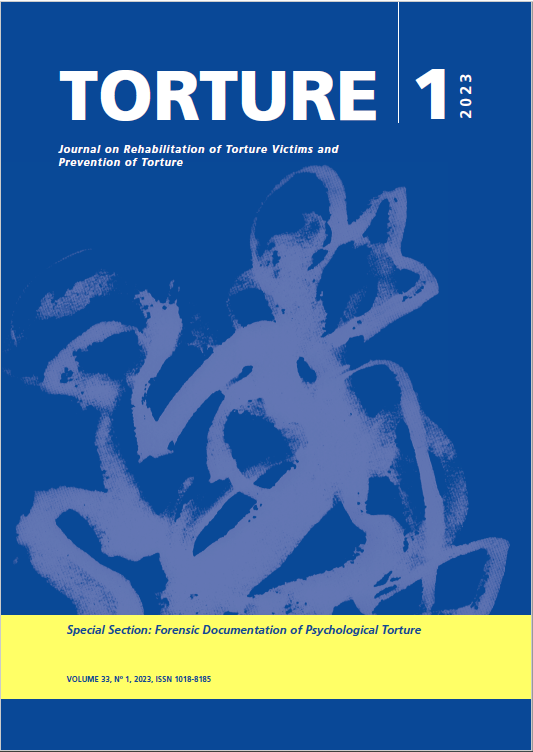Exploratory study on the quality of forensic assessments using the Istanbul Protocol in a virtual versus face-to-face environment
DOI:
https://doi.org/10.7146/torture.v33i1.131491Keywords:
Istanbul protocol, remote assessmentAbstract
Introduction. With the advent of the Covid-19 pandemic, most torture victim care centres had to adapt their forensic assessment methods and move to online methodologies. It is essential to assess the advantages and disadvantages of this type of intervention, which seems to be here to stay.
Method. Based on a sample of 21 Istanbul Protocols (IPs) conducted with survivors of torture (SoT) applying for international protection between 2020 and 2021, both professionals (n=21) and SoT (n=21) were interviewed comparing face-to-face (n=10) and remote (n=11) interviews concerning the assessment process, satisfaction, difficulties encountered and fulfilment of therapeutic aspects.
Results. No substantial problems were found about the ethical requirements of the IP. Satisfaction with the process was also positive in both modalities. Regarding the process, there were frequent connection problems and a lack of adequate material resources in the remote assessments, requiring a significantly higher number of sessions by IP. Survivors were more satisfied than therapists. Overall, the forensic experts described problems in complex cases with understanding the person's emotional response and establishing a bond and undertaking psychotherapeutic interventions in the event of an emotional crisis during the assessment. In the face-to-face protocols, logistical and travel problems were frequent, which meant that forensic work times had to be adapted.
Discussion. The two methodologies are not directly comparable but have specific issues to be studied and addressed. More investment and adaptation is needed in the remote methodology, especially given the financial vulnerability of many survivors. Remote assessment could be an alternative to face-to-face interviews in specific cases. However, there are very relevant human and therapeutic aspects that indicate that, whenever possible, face-to-face assessment should be preferred.
References
Cohen, J., Gregory, B., Newman, K., Rowe, E. J., & Thackray, D. (2021). Remote medico-legal assessment by telephone during COVID-19: Monitoring safety and quality when documenting evidence of torture for UK asylum applicants. Defining and Documenting Threats in the Context of Ill-Treatment and Torture. Medical and Psychological Perspectives., 31(1), 37.
Green, A. S., Ruchman, S. G., Katz, C. L., & Singer, E. K. (2020). Piloting forensic tele-mental health evaluations of asylum seekers. Psychiatry Research, 291, 113256. https://doi.org/https://doi.org/10.1016/j.psychres.2020.113256
Greenhalgh, T., Koh, G. C. H., & Car, J. (2020). Covid-19: a remote assessment in primary care. Bmj, 368.
Gruber, M., Eberl, J.-M., Lind, F., & Boomgaarden, H. G. (2021). Qualitative Interviews with Irregular Migrants in Times of COVID-19: Recourse to Remote Interview Techniques as a Possible Methodological Adjustment. Forum: Qualitative Social Research, 22(1).
Mishori, R., Hampton, K., Habbach, H., Raker, E., Niyogi, A., & Murphey, D. (2021). “Better than having no evaluation done”: a pilot project to conduct remote asylum evaluations for clients in a migrant encampment in Mexico. BMC Health Services Research, 21(1), 508. https://doi.org/10.1186/s12913-021-06539-5
Pogue, M., Raker, E., Hampton, K., Saint Laurent, M. L., & Mishori, R. (2021). Conducting remote medical asylum evaluations in the United States during COVID-19: Clinicians’ perspectives on acceptability, challenges and opportunities. Journal of forensic and legal medicine, 84, 102255. https://doi.org/10.1016/j.jflm.2021.102255
Raker E., Niyogi A. (2022) Performing Remote Asylum Evaluations. In: McKenzie K.C. (eds) Asylum Medicine. Springer, Cham. https://doi.org/10.1007/978-3-030-81580-6_9

Downloads
Published
How to Cite
Issue
Section
License
Copyright (c) 2023 Torture Journal

This work is licensed under a Creative Commons Attribution-NonCommercial-NoDerivatives 4.0 International License.
We accept that some authors (e.g. government employees in some countries) are unable to transfer copyright. The Creative Commons Licence Attribution-NonCommercial-NoDerivatives 4.0 International (CC BY-NC-ND 4.0) covers both the Torture Journal and the IRCT web site. The publisher will not put any limitation on the personal freedom of the author to use material contained in the paper in other works which may be published, provided that acknowledgement is made to the original place of publication.

